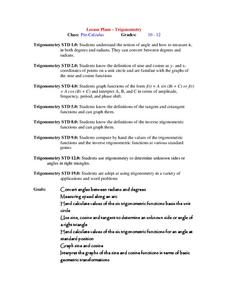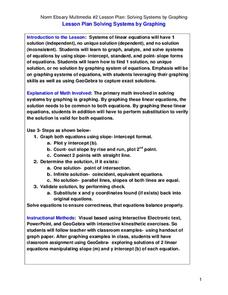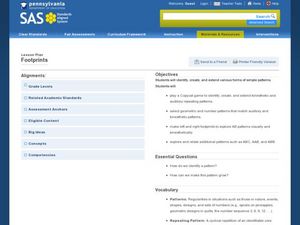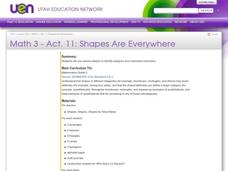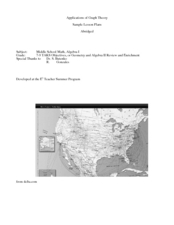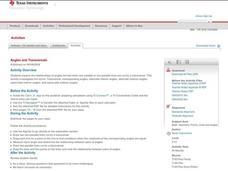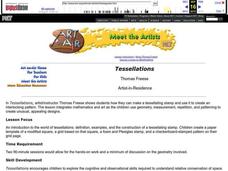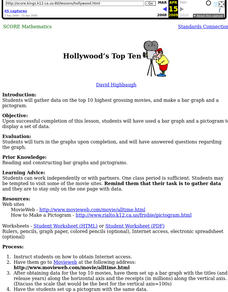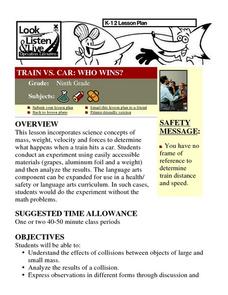Curated OER
Characteristics and Functions of Money
Fourth graders discuss the function and characteristics of money. For this financial education lesson plan, 4th graders read the book The Go-Around Dollar by Johnston Adams. This book sparks a conversation on how money is used and the...
Curated OER
Banana Man Glider
Students incorporate technology into the classroom as they investigate force and motion. In this science lesson, students construct a glider to be able to safely take a banana to the ground without dropping it. They investigate flight,...
Curated OER
Trigonometry
Students investigate angles converting them from radians to degrees. For this trigonometry lesson, students work with angles and the six different trig ratios. They graph the functions representing each trig functions and identify the...
Curated OER
Solving Systems by Graphing
Students solve systems of equation through graphing. In this algebra lesson plan, students solve linear equations and analyze the result to figure out if there is one solution, no solution or infinitely many solutions. They graph their...
Curated OER
Footprints
Students explore patterns. In this patterns geometry lesson, students identify and extend patterns including body parts, movement, geometric shapes, noises, and footprints. Students create and share an original pattern.
Curated OER
Polly and the Shapeshifter
Students analyze the patterns in polygons and relate it to the rate of change. In this algebra lesson, students discuss the relationship between the data and the graph of the data.
Curated OER
Numbers Beyond Reason!
Fourth graders use the story of the discovery of irrational numbers to explore the different classes of numbers, the different ways in which numbers may be represented, and how to classify different numbers into their particular class.
Curated OER
That's So Square
Students familiarize themselves with the three most common geometric shapes: circles, triangles and parallelograms. They sketch, sort, and name the shapes.
Curated OER
Shapes Are Everywhere
Third graders use various shapes to identify polygons and understand symmetry. They explore pattern blocks noticing their similarities and differences, then share with other team members. They draw 3 polygons in their journals and...
Curated OER
Making Change
Students investigate how to make change when purchasing items. In this making change lesson, students examine a scenario to calculate the correct change. Students play Bingo based on information and calculations to determine...
Curated OER
Tall Tale Rollers
Students explore American tall tales. In this tall tale lesson, students discover the six characteristics that are included in tall tales. Students survey their class to find each student's favorite tall tale character and organize the...
Curated OER
Migration of the Neo-Tropical Songbirds
Fifth graders plot the migration of birds using Google Earth. For this lesson on bird migration, 5th graders work in groups to plot the migration of a group of birds using Google Earth. Students present and discuss their findings and...
Curated OER
Application of Graph Theory
Students investigate different online tutorials as they study graphing. In this graphing lesson, students apply the concept of graphs cross curricular and use it to make predictions. They define the purpose and theories behind graphs.
Curated OER
Angles and Transversals
Pupils explore the concept of angles and transversals. They construct parallel and non-parallel lines cut by a transversal using Cabri Jr. Learners then determine which angles are congruent and the relationship of angles when two lines...
Alabama Learning Exchange
I'm Lovin' It: Finding Area Between Curves
Students explore the concept of finding the area between two curves. In this finding the area between two curves instructional activity, students model the logos of McDonalds, Nike, and Motorola on grid paper. Students find functions to...
Alabama Learning Exchange
Technology for Displaying Trigonometric Graph Behavior: Sine and Cosine
Students explore the concept of sine and cosine. In this sine and cosine lesson, students work in groups to graph sine and cosine functions. Students examine how coefficients in various parts of each parent function shift the...
Curated OER
Multiplication Versus Addition
Second graders create arrays to study multiplication. In this multiplication lesson plan, 2nd graders split into teams to complete a multiplication table. One team uses addition to solve the table while the other uses multiplication....
Curated OER
Positive and Negative Angles and Arcs
To better understand that the intersection point of two lines lies inside a circle, learners use their keen measurement skills. They discuss arcs, rays, tangent lines, and reflex angles. Then, they put their skills to work as they...
Pennsylvania Department of Education
Fraction Strips
Students explore number sense by participating in a class fraction game. In this number value instructional activity, students utilize strips of paper with fractions written on them and conduct a trivia game in which teams challenge each...
Curated OER
Tessellations
Students learn and review basic geometric terms, definitions, and theory, including regular polygons, lines, angles, points, etc. They make a tessellating stamp and create a repeating work of art.
Curated OER
First Class First? Using Data to Explore the Tragedy of the Titanic
Students analyze and interpret data related to the crew and passengers of the Titanic. They research information on a Titanic database to illustrate specific statistical conclusions, and whether or not social status affected the outcome.
Curated OER
Hollywood's Top Ten
Students gather data on top 10 highest grossing movies, and make a bar graph and a pictogram.
Curated OER
Train vs. Car: Who Wins?
Ninth graders conduct an experiment demonstrating what happens when a train hits a car using easily accessible materials. They calculate momentum, velocity, and distance using the appropriate formulas. Then they write an incident report...
Smithsonian Institution
Geometric Shapes Collage
Junior geometers practice stating the names of different geometric shapes. They define and name the different shapes and compare and contrast shapes to one another. They also relate the shapes to objects in the real world.


